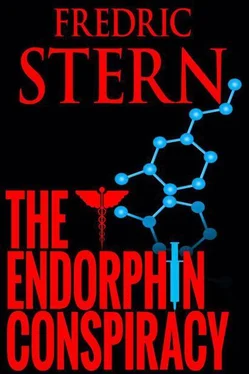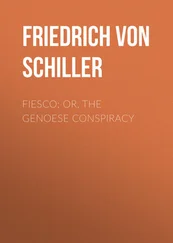Fredric Stern
THE ENDORPHIN CONSPIRACY
A Novel
To Ana, my soul mate, for her never-ending support, faith and love.
“In the councils of government, we must guard against the acquisition of unwarranted influence, whether sought or unsought, by the military-industrial complex. The potential for the disastrous rise of misplaced power exists and will persist.”
—President Dwight D. Eisenhower, in his Farewell Address to the Nation, January 17, 1961
September 12, 1967
The pungent odor of incense assailed him. His temples pounded, his sinuses thickened. Cameron Daniels cleared his throat, set the current issue of Life on the night stand next to his bed, and scanned his hospital room for the source of the cloying smell. As usual, there was nothing. Why incense? Why did it always start the same way?
The doctors told him it was an olfactory hallucination from deep within the recesses of his brain—the temporal lobes—an association from his childhood. They said he must have been regressing, reaching back to a safer and more secure time in his life. Cameron Daniels, altar boy. They said the stress of working as a technical analyst for the CIA must have gotten to him, that it happened to a lot of people.
It just didn’t make sense. He hadn’t felt unusually stressed until after the first time it happened at the agency retreat in Virginia. Since then he had had no peace. His life was hell. It was no consolation there were others like him, and he didn’t buy the doctors explanation. Neither did his wife, who had been left a widow—at least emotionally—to care for their baby daughter for the last six months.
The chiming of bells nearly jolted Daniels out of bed. Church bells ringing, just as they had every Sunday during his childhood in Montreal. Now they were so numerous and loud they seemed to rattle his very skull.
He placed his palms over his ears. “God, not again. Stop. Stop ringing those damn bells! I can’t take it anymore!”
The ringing continued.
“Please!” His eyes clamped shut. His head moved painfully from side to side. He cried like a child, rocking back and forth in bed. “Why? Why me? What did I do to deserve this?”
Then silence.
Daniels waited for a full minute to be sure—often they came back suddenly—then opened his eyes and removed his hands from his ears. The silence remained unbroken. He thought it was over. Then a voice cut through to his consciousness: “Cameron. Cameron, do not despair.”
The voice was familiar, feminine, one he could not place but soothed him. Each time it had become stronger, drawing him in by degrees.
“Cameron, I can help you find peace. Let me help you.”
Daniels wiped his eyes and looked towards the window. Rays of early morning sunlight streamed between the slats of the blinds, projecting a kaleidoscope of dancing shapes and colors that seemed to coalesce into human form.
“Why do they torture me like this?” His mouth twisted in pain.
Features formed into a human face, smiled. “I am here to give you salvation. Come to me.” A hand stretched out to Daniels, beckoning.
He threw off the sheets, picked up Life , eased himself out of bed, and staggered toward the window, swatting at the face before him with the magazine. “Get out of here! Go away! I want my mind back! I want peace!”
The bells resumed, hundreds, perhaps thousands of bells, chiming more and more loudly until Daniels felt his head would burst. He clamped his hands over his ears. “No, God no!”
He opened the blinds, the bright light causing him to squint, and pressed his forehead against the pane. “Stop, please stop. I’ll do whatever you say!”
“Come to me Cameron, and you will be free.”
The voice came from outside. He could see her clearly now, hovering just beyond the window.
Frantically, Daniels tried to open it. But like all the patient windows in the psychiatric wing at Bethesda, it was locked. The ringing continued, echoing madly inside his head. The pain was past endurance. Desperately, he searched the room, his gaze coming to rest on the chair.
The sound of the chair smashing the window echoed eerily through the room, along the corridor. Seconds later, a young male orderly burst into the room, but it was too late. Cameron Daniels had found his peace.
* * *
The encrypted cable arrived by special courier late in the afternoon at the Human Ecology Institute in Montreal. Dr. Rudolph Schmidt, the Director, was clearly shaken as he read the decoded message.
“SEPTEMBER 13 1967, 0600. EFFECTIVE IMMEDIATELY MK ULTRA IS TERMINATED. ALL DOCUMENTS TO BE DESTROYED. DO NOT, REPEAT, DO NOT ATTEMPT CONTACT. END OF MESSAGE.-BLUEBIRD”
Schmidt slumped down in his chair, his hand still grasping the cablegram.
“Dr. Schmidt, are you okay?” Josef Balassi asked with concern.
Schmidt stared blankly across the room.
His young research assistant reached across the desk for the cablegram. “May I?”
Schmidt nodded.
Balassi read the note, his fiery brown eyes narrowed in anger. “How could they do this? Ten years of research snuffed out in an instant by fools who know nothing of what you’ve accomplished! We can’t do it, we won’t! ”
“We don’t have a choice.”
“Yes, we do.” Balassi stood, stared down at Schmidt. “Yes, we do.”
July 1, 2010
His pulse raced as he sprinted down Fort Washington Avenue towards the New York Trauma Center. Dr. Geoffrey Davis checked his watch. Six-thirty a.m. He was running late on his first day back. Bad form. There’d be hell to pay with Dr. Pederson before he even had a chance to meet his team at rounds. Of all days to oversleep, this was the worst.
Even at this hour, Washington Heights bustled with activity. Cab drivers honked their horns at anyone or anything that got in their way, shopkeepers swept yesterday’s rotting garbage off their sidewalks into the street, people rushed to subway stations, likely everyone, like him, breaking an early sweat in the sultriness that lingered from the night before.
Geoff stepped off the curb at 175th Street, passed the entrance to the George Washington Bridge. He was jolted by the intrusive beeping of his pager. “Shit,” he muttered. He despised the stupid beeper. It made his gastric juices gurgle and his muscles tense every time it went off. Even after all these years. Geoff reached down with his right hand, depressed the grey button and glanced down at the pager at his waist. His attention was diverted from the road ahead barely a second when he was startled by the shrill horn from a rusted, brown Camaro headed directly at him, not more than three feet away. He dodged quickly to his right, tripped over the curb on the south side of the street, and lost his balance. His right shoulder crashed hard into the buckled sidewalk as he attempted to break his fall. His face landed next to a fresh pile of dog shit.
“Look where you’re goin’, man!” yelled the driver. “You tryin’ to get yourself killed?”
Geoff flipped him off. He couldn’t wait to get out of this rat trap of a city. Just one more year.
He lifted himself up off the sidewalk, picked up his backpack and swatted away the flies that hovered over the pile left by one of the scores of neighborhood mongrels. His shoulder ached, and a few drops of blood trickled from his elbow. He brushed off his shoulder and tested his arm by moving it back and forth. Nothing broken. He was lucky and he knew it; he could have been killed.
Geoff reached down and felt for the knife he kept strapped to his right shin. It was secure in the sheath. His fellow residents thought he was paranoid to carry the thing everywhere he went, but for Geoff it was more than a habit. His days as a Navy Seal had taught him many useful things, one of which was being prepared for any situation that might arise. Ironic. Washington Heights had become more like a war zone than a neighborhood, potentially more dangerous than a number of training missions he had been on.
Читать дальше












